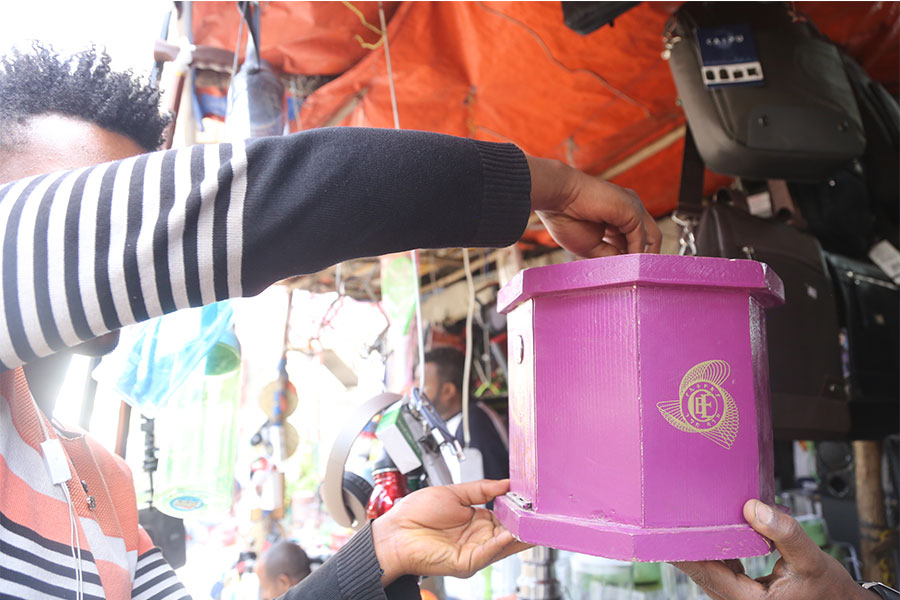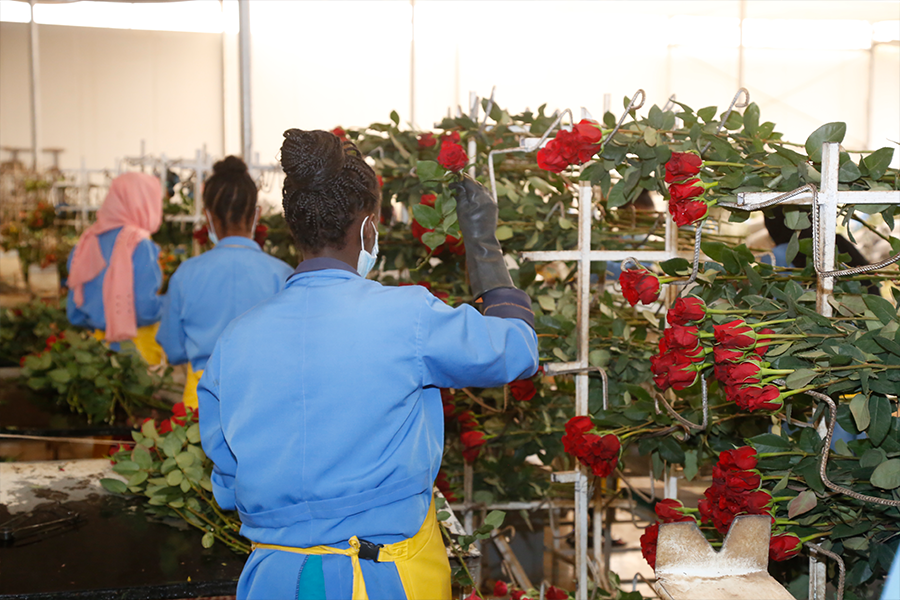
Fortune News | Apr 13,2024
A recent directive is roiling the coffee industry, following the Central Bank's requirement that exporters convert half of their foreign exchange earnings into local currency within 30 days. Exporters say it is squeezing them at a precarious time.
"The deadline is too unrealistic," said Abdu Hussien, export manager at Adulina Coffee Export Plc, a major player in the coffee market.
Incorporated 13 years ago under Mahabub Mustefa, Adulina exports coffee and imports raw materials like chemicals, aluminium, and rebars to supply factories. Last fiscal year, the company was among the top 10 coffee exporters, shipping 5,667tns of coffee to markets in Europe and the U.S., earning nearly 28.9 million dollars. Exporters like Adulina rely on importing goods to offset losses from the volatile coffee export market.
"The import business is important to us," Abdu told Fortune.
However, a directive issued by the National Bank of Ethiopia (NBE) threatens this balance.
"The time is simply not enough," said Tewodros Yilak, co-founder and CEO of BNT Coffee & Industry Plc, a major exporter and bottler of the "Dega" water brand. The retention policy also affects businesses relying on importing critical materials, compounding problems for companies like BNT.
Central Bank officials argue that the retention policy stabilises the Birr, after they liberalised the foreign exchange regime. Since July, Birr has depreciated by over 100pc after it was floated in the exchange market, a monetary policy shift tied to broader economic reforms agreed with the International Monetary Fund (IMF). These reforms target to close the gap between the official and parallel exchange markets and boost export competitiveness. The depreciation adds another layer of difficulty for exporters converting foreign earnings into a weakening Birr.
Many exporters have turned to imports to offset export losses during times of volatile prices. Despite new market opportunities in the Middle East and East Asia, the sector remains under pressure due to high domestic coffee prices and competition from countries like Brazil. However, Ethiopia's coffee export earnings reached a historical record of 1.43 billion dollars last fiscal year. Yet, the industry struggles with a mismatch between international and domestic prices.
According to Gizat Worqu, general manager of the Ethiopian Coffee Association (ECA), a powerful industry lobby group, there is a substantial disparity between domestic prices and international buying offers. A recent surge in domestic prices has caught the industry off guard, raising concerns about selling at a loss.
Nonetheless, Central Bank officials believe their measure to keep the retention period no longer than one month could enhance economic competitiveness, unlock export potential, and attract foreign direct investment (FDI).
"There needs to be enough foreign exchange to fuel import," said Vice Governor Fikadu Digafe, stating the importance of supporting import activities and enhancing foreign exchange liquidity in commercial banks.
The Vice Governor noted that most importers are not exporters, arguing for broader economic considerations.
Exporters argue that the tight timeline does not reflect business realities. Nearly 700 active coffee exporters operate, many struggling under the new policy. Industry leaders have been discussing the directive with Central Bank officials, hoping for revisions. Gizat sounded optimistic about the ongoing talks.
"We're exploring different options," he told Fortune.
One option on the table is to extend the retention period to 90 days. It is a voice BNT managers have echoed the Association, requesting an extension.
The Ethiopian Coffee & Tea Authority (ECTA), a federal regulatory agency in charge of the sector, acknowledges the limitations of its influence over national policies.
"We plan on bringing the issue up to the Central Bank soon," said Adugna Debela, its director general.
Central Bank Governor Mamo Mihretu recognises exporters' concerns and says the NBE is working to resolve the issue.
"We're looking into it," he told Fortune, asserting that macroeconomic reform has led to a considerable increase in foreign currency reserves, up to 80pc. "There is no forex liquidity problem in commercial banks."
Tadesse Hatiya, president of Sidama Bank, concur with the official policy of one-month retention, arguing that it has been effective in boosting foreign exchange reserves and ensuring customers have access to forex. He observed the monetary policy reforms have enabled banks to increase foreign exchange reserves by nearly 60pc, resulting in an improved stockpile. Yet he acknowledged that liquidity shortages in Birr limited banks' ability to offer essential loans to businesses.
However, President Taye Atskeselassie, in his inaugural parliamentary address, announced that banks currently hold 2.5 trillion Br in deposits. However, the liquidity shortages have resurfaced due to economic stress. Banks urge business owners to import goods rather than convert foreign currencies into Birr.
While bankers express optimism about the reforms, challenges remain, particularly in ensuring cash liquidity. For Teferi Mekonnen, president of the Oromia Bank, strict fiscal and monetary policies implemented to control inflation have constrained local currency in commercial banks, making them reluctant to extend loans. He argued that the retention limit has further tightened liquidity, as large depreciation has depleted local currency reserves during conversions.
"Balance needs to be struck between local and foreign currencies," said Teferi. "Banks need to remain solvent."
The cash liquidity shortage in commercial banks has heavily impacted exporters, who are unable to secure financing and have to rely on credit for their operations. Oromia Coffee Farmers’ Cooperative Union, representing over half a million farmers, is one such business under pressure due to limited access to credit.
"We're under financial strain," conceded General Manager Dejene Dadi.
With the depreciation of the Birr against major currencies, the Union requires 2.9 billion Birr for operations but has secured only half. Domestic coffee prices have doubled in certain regions, reaching 400 Br a quintal. However, the Union remains a major exporter, shipping 80 containers of coffee in the previous fiscal year and earning nearly 21 million dollars.
Finance remains an issue for farmers and suppliers.
Mesfin Kare is the director general of Sidama Coffee, Fruits & Spices Development, a company that produced over 25,000 tons last year Mesfin expects to produce 36,000tns this year, but access to finance remains top in the list of problems to overcome. Mesfin disclosed an ongoing discussions with commercial banks to improve the situation.
According to Adugna of the Authority, the long-term plan is to urge exports to rely on themselves without needing the import business for sustainability. Despite the mismatch, he noted improvements in helping coffee exports and making them profitable. In the past two months alone, Ethiopia exported 80,000tns of coffee, earning nearly 377 million dollars. The recent currency float is seen as a positive step toward promoting exports and increasing foreign exchange inflows.
Though Ethiopia's foreign currency reserve remains below the optimal three-month import coverage, the Central Bank has implemented several measures to increase the reserves of commercial banks, including launching a foreign exchange auction. According to federal government data, foreign currency earnings amounted to over 25 billion dollars last fiscal year, including 6.8 billion dollars in remittances, 3.9 billion dollars in foreign direct investment, and 3.8 billion dollars from merchandise exports.
Veteran banker Worku Lemma sees the new directive as part of a more comprehensive government plan to address fiscal constraints and expedite imports of essentials like fuel, petroleum, and pharmaceuticals. He justified the Central Bank's measures based on the prolonged foreign exchange crisis.
"Foreign exchange cannot stay stranded," he said, defending the system for granting liquidity to commercial banks, bringing price stability, and improving foreign exchange access for other importers.
However, he cautioned that the time limit would be insufficient for exporters, echoing the industry's proposal for a three-month extension. According to Worku, banks could address liquidity problems by lending to each other, with Central Bank support.
"Banks need a liquidity intervention from the National Bank," he said.
Economic researcher Yirga Shewaferaw commended the Central Bank's decision to liberalise the foreign exchange market. He believes floating rates can help address trade imbalances by making exports cheaper and imports more expensive.
According to Yirga, the success of the floating exchange rate depends on a strong financial sector with well-capitalised banks, sufficient foreign exchange reserves, and timely central bank intervention. He urged exporting businesses to adopt new strategies, stating that selling at a loss and relying on currency variations for imports is not sustainable.
"There needs to be a new marketing strategy and market projections," he said. "Exporters now cannot rely on imports to become profitable. They cannot go on as they did before."
Exporters' growing problems with logistical constraints, including freight issues, security crises on the Red Sea corridor, and payment delays in international transactions, add to their woes. Large buying countries such as Saudi Arabia, the U.S., and Germany account for most of Ethiopia's coffee exports. Yet declining demand has left many with excess inventory, unable to compete internationally due to inflated domestic buying prices and increased production from competitors.
No less alarming is the looming European Deforestation Regulation (EUDR), ratified in June 2023. It mandates irrefutable proof that coffee exports sending the beans to the European market have not contributed to deforestation since December 2020. Europe represents a large market, consuming nearly half the global coffee supply and accounting for 30pc of Ethiopia's coffee exports.
"The regulations threaten to complicate our export space further," Gizat told Fortune.
While the European Commission has extended the deforestation regulation deadline by one year to December 2025, providing temporary relief, compliance remains a considerable burden. It is upon exporters to adhere to strict labour and human rights standards, including the rights of indigenous communities, and provide due diligence statements to confirm compliance. The Authority had submitted proposals requesting the extension. It is preparing seven strategic targets to ensure compliance with the EUDR.
"We needed the help," Adugna told Fortune. "We're also penetrating markets outside Europe."
PUBLISHED ON
Oct 13,2024 [ VOL
25 , NO
1276]

Fortune News | Apr 13,2024

Editorial | Jun 29,2024

Fortune News | Mar 16,2024

Featured | Feb 16,2019

Fortune News | Aug 18,2024

Radar | Apr 30,2021

Commentaries | Jun 24,2023

Radar | Feb 10,2024

Fortune News | Sep 01,2024

Commentaries | Nov 30,2019

Dec 22 , 2024 . By TIZITA SHEWAFERAW
Charged with transforming colossal state-owned enterprises into modern and competitiv...

Aug 18 , 2024 . By AKSAH ITALO
Although predictable Yonas Zerihun's job in the ride-hailing service is not immune to...

Jul 28 , 2024 . By TIZITA SHEWAFERAW
Unhabitual, perhaps too many, Samuel Gebreyohannes, 38, used to occasionally enjoy a couple of beers at breakfast. However, he recently swit...

Jul 13 , 2024 . By AKSAH ITALO
Investors who rely on tractors, trucks, and field vehicles for commuting, transporting commodities, and f...

Oct 25 , 2025
The regulatory machinery is on overdrive. In only two years, no fewer than 35 new pro...

Oct 18 , 2025
The political establishment, notably the ruling party and its top brass, has become p...

Oct 11 , 2025
Ladislas Farago, a roving Associated Press (AP) correspondent, arrived in Ethiopia in...

Oct 4 , 2025
Eyob Tekalegn (PhD) had been in the Governor's chair for only weeks when, on Septembe...